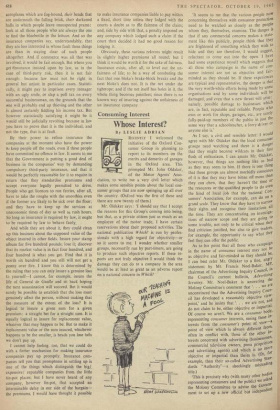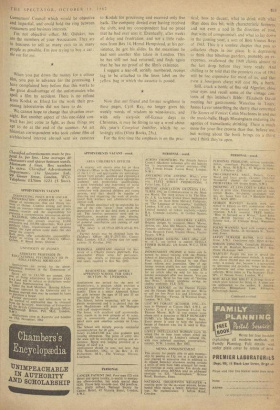Consuming Interest
Whose Interest?
By LESLIE ADRIAN
Mr. Oldaker says : 'I should say that I accept the reasons for this Group's coming into being, but that, as a private citizen just as much as an employee of the motor trade, I have certain reservations about their proposed activities. The national publication Which? is run by profes- sionals with a high regard for objectivity—or so it seems to me. I wonder whether smaller groups, necessarily run by part-timers, are going to produce such objective reports. If these re- ports are not truly objective I would think the damage they can do to a company in the area would be at least as great as an adverse report on a national concern in Which? `It seems to me that the various people now concerning themselves with consumer protection need to be watched as closely as the people whom they, themselves, examine. The danger is that if any commercial concern makes a state- ment like this publicly, people think that they are frightened of something which they wish 10 hide and they are therefore, I would suggest, reluctant to come out into the open. I have had some experience myself which suggests that all those who campaign in the name of con-
sumer interest are not as objective and fair- minded as they should be. If these experiences are typical and representative, the danger is that the very worth-while efforts being made by some organisations and by some individuals will be damaged, and even that a new threat will arise: namely, possible damage to businesses which are, in fact, reputable and reliable. People who own or work for shops, garages, etc., are surely fully-paid-up members of the public in just the same way that a schoolteacher, a lorry-driver or anyone else is.' As I say, a civil and sensible letter. I would agree with Mr. Oldaker that the local consumer groups need watching and there is a danger that they might become wildcats in their first flush of enthusiasm. I can assure Mr. Oldaker, however, that things are nothing like as bad as they may seem to him. If there is one thing that these groups are almost morbidly conscious of it is that they may have bitten off more than they can chew, that they haven't the time or the resources or the qualified people to do even the kind of local job that the national Con- sumers' Association, for example, can do on a grand scale. They know that they have to narrow their sights and recognise their limitations all the time. They are concentrating on investiga- tions of narrow scope and they are going 1° some trouble, not only to be critical when they find criticism justified, but also to give traders, for example, the opportunity to say what they feel they can offer the public. As to his point that all those who campaign in the name of consumer interest may not be as objective and fair-minded as they should be, I can best refer Mr. Oldaker to a fine, angrY statement by Mr. Francis Noel-Baker, 10P • chairman of the Advertising Inquiry Council,. in the Council's current bulletin, Advertising Scrutiny. Mr. Noel-Baker is answering the Molony Committee's comment that `. . . we are unconvinced that the Advertising Inquiry Coun- cil has developed a reasonably objective view- point,' and he insists that `. . . we are not, and do not claim to be, either objective or impartial. Of course we aren't. We are a consumer body, representing consutner interests, seeing these in- terests from the consumer's point of view—"a point of view which is always different from, often in conflict with, those of the other In- terests concerned with advertising (businessmen, commercial television owners, press proprietors and advertising agents) and which is no more objective or impartial than theirs is. (Or, for example, than their so-called Advertising Stan- dards "Authority"—a shockingly misleading title.) `This is precisely why (with many other bodies representing consumers and the public) we asked the Molony Committee to advise the Govern- ment to set up a new official but independent Consumers' Council which would be objective and impartial, and could hold the ring between consumers and business interests.'
I'm not objective either, Mr. Oldaker, nor are the members of your Association. They are in business to sell as many cars to as many people as possible. I'm just trying to buy a car: the car for we.
When you put down the money for a colour film, you pay in advance for the processing. 1 have complained here before that this works to the great disadvantage of the unfortunates who spoil a film by accident. There is no refund from Kodak or Ilford for the work their pro- cessing laboratories did not have to do.
We cannot hope to change that situation over- night. But another aspect of this one-sided con- tract has just come to light, as these things are apt to do at the end of the summer. An art historian correspondent who took colour film of architectural interest abroad sent six cassettes to Kodak for processing and received only five back. The company denied ever having received the sixth, and my correspondent had no proof that he had ever sent it. eventually, after weeks of delay and frustration, and not a little rude- ness from Box 14, Hemel Hempstead, at his per- sistence, he got his slides. In the meantime he had sent another film taken in London. This he has still not had returned, and finds again that he has no proof of the film's existence.
I suggest a tear-off, serially numbered, receipt tag to be attached to the linen label on the yellow bag in which the cassette is posted.
Now that our friend and former neighbour in these pages, Cyril Ray, no longer gives his weekly words of wisdom to wine-lovers, and with only sixty-six off-licence days to Christmas, it may be fitting to say a word about this year's Coin pleat Imbiber, which he so lovingly edits (Vista Books; 25s.).
For the first time the emphasis is on the prac- tical; how to decant, what to drink with \\ hat (Ray does this bit, with characteristic firmness, and not even a nod in the direction of rose., that wine of compromise), and what to lay, down in the coming year, a sort of Best Vinous Buss of 1963. This is a sombre chapter that puts us cellarless chaps in our place. It is depressing to think that bibulous guizlers, probably on ex- expenses, swallowed the 1949 clarets almost to the last drop before they were ready. And chilling to be told that the premiers (Tits of 1961 will be too expensive for most of us, and that even a bourgeois claret will cost 305, a bottle.
Still, crack a bottle of fine old Algerian, close your eyes and recall some of the vintage con- tents of this imbiber's Bible: Elizabeth David meeting her gastronomic Waterloo in Tours: James Laver unearthing the sherry that cemented The Stones of Venice; Colin Maclnnes in and out the music-halls; Hugh Massingham enduring the agonies of transatlantic drinking. There is much more for your five crowns than that, believe me, but writing about the book brings on a thirst and I think they're open.















































 Previous page
Previous page